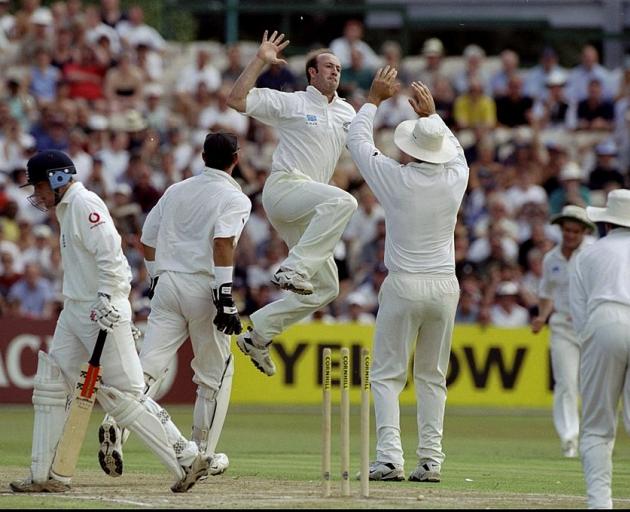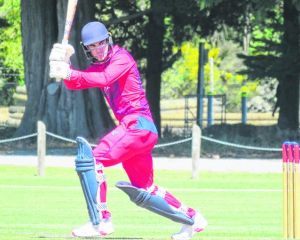
When Chris Harris made his senior premier cricket debut he was still at secondary school. Now, he’s on the brink playing at the same level more than three decades later.

Harris, now an account manager for MediaWorks predominantly in radio, personified the definition of all-rounder during the 1990s and 2000s. Harris not only contributed with bat and ball, but is also widely regarded as one of New Zealand’s greatest ever fielders. He says his exploits in the field can be thanked in part to his two older brothers Ben and Tim.
“They were four or five years older than me so after learning to walk I spent the first three years in the field and I learnt very quickly that fielding is very important, not just because it’s important to cricket, but if I dropped a catch or missed a run out they would beat me up,” said Harris.
“I was lucky enough that they eventually taught me to bowl, although they did a pretty poor job of that because I’ve got a very bad technique . . . I think I was maybe trying to copy Lance Cairns in the early days and then I could never stop it.”
Just days after celebrating his 21st birthday Harris made his international one-day debut for New Zealand in a one-day in a loss to Australia at the Sydney Cricket Ground in 1990.
“I remember Andrew Jones getting so much abuse that when we got a wicket he came in and said: ‘Right guys I’ve had enough, I’m going to call 99 then jump over the fence and pick out a spectator and start hitting them, I want you guys to follow me’. So Martin Crowe was the captain and he said: ‘Right Andrew you come into the circle and Chris you go out there,” said Harris.

Throughout his international career Harris remembers some of his highest of highs coinciding with equally as emphatic lows.
Harris played in four World Cups for New Zealand. The 1992 World Cup is the one he remembers the most fondly, but also as the most sombre. New Zealand topped pool play before losing to eventual winners Pakistan by four wickets in a semi-final at Eden Park.
“People don’t remember, but we were coming off a three-nil series loss to England leading into the World Cup, so the expectations weren’t good. We had been doing a lot of planning and I remember that first game against Australia how amazing the crowd were and from that day forward when we beat Australia at Eden Park in front of about 40,000 people, just the following and the support was amazing,” said Harris.
“[In the semi-final] to watch senior players like Martin Crowe and Rod Latham who was a pretty hard man, to watch them effectively crying walking around the boundary was sombre and tough to take,” said Harris.
Four years later Harris’ highest one-day score of 130 came in a six-wicket loss to Australia in the quarter-final of the 1996 Cricket World Cup. However, the great individual display wasn’t enough to stop Australia reaching the target of 286 with 13 balls to spare.
In 2000 Harris played a key role in New Zealand chasing down India’s total of 264 to win the final of the ICC Champions Trophy. New Zealand were battling at 132/5 midway through the innings before Harris contributed 46 with the bat during a crucial 122 sixth-wicket partnership with Chris Cairns which ultimately laid the platform for the four-wicket victory with two balls to spare.

“It was like being shot in the arm. I literally couldn’t move my arm. I tried practising to bowl and I realised I had no chance, so I went up to Flem[ing] at the end of the over and said: ‘I don’t think I can bowl mate I’ve got to go off,” he said.
Later in the match New Zealand found themselves 166/8 and still 95 runs short of Australia’s total and the prospect of Harris batting didn’t look likely. However, an inspired not-out innings from Kyle Mills which included four sixes meant New Zealand were just 26 runs short of victory when the ninth wicket fell.
Harris scored just four runs from six deliveries - many of which arrived at 150km/h and aimed directly at his shoulder from Brett Lee – before being bowled by Glen McGrath 17 runs short of the total.
“I remember getting my arms up to play the ball and the pain was quite unbearable. I had obviously taken a lot of paracetamol and codeine, so I was a little bit out of it, but it was a little bit sad because we got so close.”
In one-day international cricket Harris scored 4379 runs at an average of 29. He also took 203 wickets at an average of 37.50. However, more impressively he carried an economy rate of just 4.28 runs per over, Harris never established himself a regular in the New Zealand test side. He made just 23 appearances between 1992 and 2002 resulted in a disappointing batting average of 20.44 and an ineffective bowling average of 73.12.
“In the early days I was always led to believe test cricket was a defensive game and if you look now it’s not at all. If I had my time again I would have played my test cricket like my one-day cricket,” he said.
Harris continued playing domestically for Canterbury until 2010 as well as stints in India and two years of playing and coaching in Zimbabwe before a year playing for Papatoetoe in Auckland.
Upon returning to Christchurch Harris began working in sales and continued to play club cricket for Sydenham – which he has no plans of giving up on anytime soon.
He has also now involved with Sky Sport’s commentary team and will cover many domestic T20 games during December and January.












